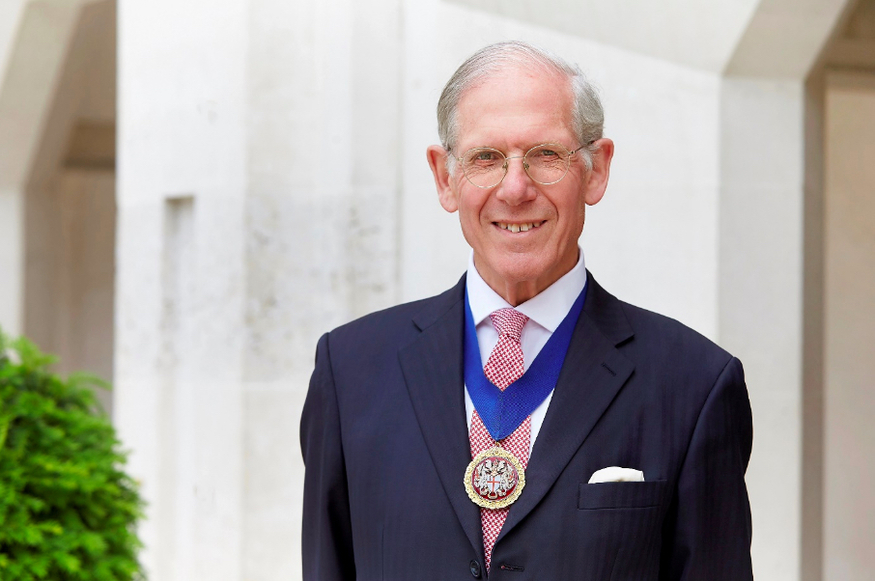
Tom Hoffman is the Chief Commoner of the City of London. Below he explains what that currently means, and what he intends to make it mean.
Tradition and ceremony are important parts of every society. And the City of London has a rich and colourful history, full of customs and pageantry, built up over 1,000 years. I value tradition, but I also value the importance of making a difference.
For 1000 years, we've had local government here, the oldest continuous local government in the world, running uninterrupted since Roman times. The modern City of London — the world's leading international financial and cultural centre — has been forged through an intense history of continual change and renewal. That has never been more true than today, when change is necessary to keep up with the fast-paced modern world.
I am the Chief Commoner at the City of London Corporation, the governing body of the Square Mile. The role is woven into the fabric of Guildhall — the City of London's historic seat of government — and the Square Mile as a whole.

"My job's been going since 1444"
The role of Chief Commoner lasts for one year, and it evolves with every new appointment. Every person puts their own individual stamp on the job.
The position goes back to 1444 when the City's lands were granted to it by King Henry VI, and a committee was established to manage those lands. Just as committees run every facet of local government today, the City Lands Committee was formed and became a powerful body in the City Corporation, overseeing the City's assets. The Chairman elected by that committee was given the title of Chief Commoner.
Things don't quite work that way anymore, and in 2011 the role adapted to keep up with the modern world. It was decided that the Chief Commoner should instead be the foremost representative of the elected Common Councillors in the Court of Common Council — the City of London Corporation's top decision-making body, headed by the Lord Mayor.

The modern City of London
That brings us to today.
The City of London Corporation is now a major public services provider for the capital. It manages a wide portfolio including social housing across six London boroughs, 10 high-achieving academies, three wholesale markets, and 11,000 acres of green space. It runs the Barbican Centre which is Europe's largest arts centre, Guildhall Art Gallery and part funds the Museum of London. It also runs City Bridge Trust, which gives away £20m a year to charities tackling disadvantage in the capital, and is the Port Health Authority for London, looking after the River Thames, and the Animal Reception Centre at Heathrow Airport."
I’m proud of the many cultural learning opportunities that the City provides, and the Barbican is at the forefront of this approach. One of my favourite experiences was watching a Japanese production of Macbeth, which celebrated the work of the legendary director Yukio Ninagawa. The acting was just out of this world. We were mesmerised from the word go, and it just illustrates the huge contribution that global talent makes to London’s position as the greatest city in the world.

I've served for 17 years at the City of London Corporation and it's fantastic to see all the exciting things taking place. Before being Chief Commoner, I was the Master of the Tilers and Bricklayers livery company. In this role I launched a special appeal to help raise enough money to send a London child from a financially disadvantaged background, to Christ’s Hospital, a school where most students receive bursaries. She was educated there for seven years and it proved to be life changing for this little girl. She now has great self-confidence and has a very bright future ahead.
Helping people from every background
I will strive to go above and beyond as Chief Commoner, and to use my time to encourage the City Corporation to be even more outward -acing than it already is, reaching out even more and giving even greater opportunities to all of London's communities, and people of every background.
One of my objectives for the year is to encourage a greater public knowledge — to young people especially — about what the City of London Corporation does for London and the UK, and about the workings of local government, about how a town or city is run.
I am arranging for students from the City's family of schools to visit Guildhall for a conference in December when they will have the opportunity to learn about how a town functions and what it provides. I want to make it possible for them to have a greater insight into how we serve London's communities.

I want to open Guildhall up to help people to see what goes on behind the scenes, for everyone to understand what the City Corporation does to boost social mobility for young people. And for them to know why we are campaigning against single use plastics, fighting back against the capital's air pollution and promoting the London Living Wage.
This will also be a visual journey. In May we invited London-based fine artists to apply to become the first Artist-in-Residence for Guildhall. The three-month residency will focus on 'Celebrating City Women' and we are looking for an artist who can demonstrate a keen interest in the City's history and culture. We will make an announcement on the winner soon and they will take up their residency in September 2019.
Our aim is to ignite an interest in young people to help them consider a career in local government, or to follow in my footsteps and seek election as a councillor. It is in these positions that they can make a positive contribution to their own communities. My key objective for the year is to be an agent for change.
And not just immediate change, but long-term actions that will benefit Londoners and society as a whole.


